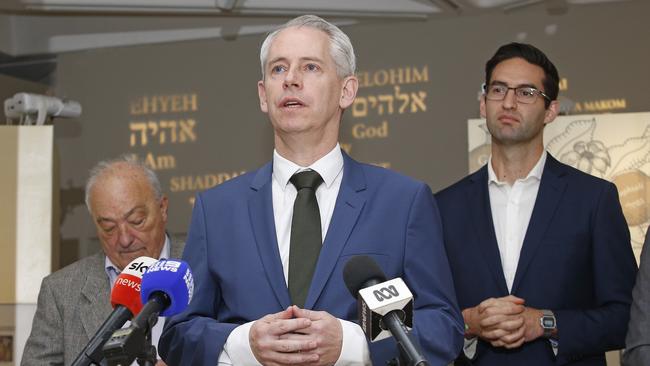Diversity report falls flat as Labor turns a deaf ear
Labor has not committed to implementing any of the recommendations in its multicultural framework review, with the reform blueprint criticised for not directly addressing rising anti-Semitism.

Labor has not committed to implementing any recommendations from the first review of Australian multiculturalism in more than 50 years, with the report drawing criticism from the Coalition for not containing a single reference to the increase in anti-Semitism.
The landmark review has put an overhaul of the citizenship test on the table, suggesting consideration be given to providing the test in languages other than English, while also proposing the ABC be given an official multicultural advisory role.
The 204-page review was delivered in March but not released until four months later by Immigration, Citizenship and Multicultural Affairs Minister Andrew Giles, with the report making 29 recommendations including more deeply integrating multicultural awareness into the curriculum and adjusting NAPLAN to “reflect this priority”.
Ten recommendations were suggested for immediate implementation, including the creation of a new multicultural affairs commission and commissioner, in addition to the establishment of a standalone department of multicultural affairs with a dedicated minister.
The Department of Home Affairs was urged to conduct an “immediate review” of the citizenship test, including the possibility of “providing the test in languages other than English”.
The review recommended the development of a national plan to promote cultural diversity and the introduction of a national language policy to unlock the economic benefits of Australia’s linguistic depth.
Anthony Albanese and Peter Dutton were encouraged to – “as soon as practically possible and appropriate in 2024” – make a statement in parliament reaffirming the government’s commitment to multiculturalism.
However, the review made no specific mention of increased anti-Semitism in Australian society following the Middle East conflict triggered by the October 7 Hamas terrorist attack on Israel.
Opposition citizenship spokesman Dan Tehan asked how the review’s recommendations could be taken seriously, arguing this was a major oversight.
“Once again, Minister Giles has completely missed the mark … he has commissioned a report at a time when social cohesion in this nation has never been challenged like it is at the moment. And the report remains silent on that disintegration of social cohesion,” Mr Tehan said. “The fact that anti-Semitism isn’t addressed in this report leaves the question: what of the recommendations, if any, can be taken seriously?”
Mr Giles said Labor had committed more than $100m to support a stronger multicultural Australia, including greater investment in language services, support for increased community engagement and better amenities allowing multicultural organisations to more effectively serve both members of their own community and the broader society.
In its response to the review, the government said it was committing only to the framework’s “principles” and would be “guided by them” to ensure the multicultural settings were fit-for-purpose.
“The review writes a new chapter in our multicultural story and will inform how we can work together to achieve a vibrant, prosperous multicultural future,” Mr Giles said.
“Our shared values of respect, unity, and compassion will underpin our multicultural nation, and the report reflects how these principles can guide us towards peace and understanding.
“Our diversity is our greatest strength, and this review showcases an Australia that we can build together as one united nation.”
Labor sources said it was still possible the government could accept some of the review’s recommendations over time.
Chaired by Bulent Hass Dellal, the executive director of the Australian Multicultural Foundation and former chair of SBS, the review recommended a formal advisory role for the ABC, SBS and the Community Broadcasting Association of Australia.
“We recommend SBS, ABC and CBAA be recognised as having a formalised advisory role in an official capacity across relevant federal government departments,” the review stated.
“In particular, this role should assist mainstream commercial media and the arts to steer away from token representation of global and cosmopolitan diversity to actual community representation and engagement.”
The review proposed the new multicultural affairs commissioner work to “improve understanding of First Nations history in Australia” including through the “citizenship processes, civic participation, pathways to permanent residency (and) education”.
It proposed the curriculum be revised “to promote and advance cultural literacies” and NAPLAN be adjusted to “reflect this priority.”
The review panel, including executive director of the Sir Zelman Cowen Centre Nyadol Nyuon, as well as Multicultural Australia chief executive Christine Castley, considered 796 public submissions and held 216 public consultations in every state and territory.
The three review panellists acknowledged that they were presenting a “necessarily ambitious framework” for Australia’s multicultural future.




To join the conversation, please log in. Don't have an account? Register
Join the conversation, you are commenting as Logout